The ambition of the 2030 Agenda and the urgency of its timeline necessitates that a new generation of the United Nations Sustainable Development Cooperation Frameworks become “the most important instrument for planning and implementation of the UN development activities at country level in support of the implementation of the 2030 Agenda for Sustainable Development (2030 Agenda)”.
This requires that the UN Country Teams collaborate with Governments to make sure that the Cooperation Framework guides the entire programme cycle, drives planning, implementation, monitoring, reporting and evaluation of collective UN support for achieving the 2030 Agenda. The Cooperation Framework should determine and reflect the UN development system’s contributions in the country and shapes the configuration of UN assets required inside and outside the country.
To realize this spirit of the UNGA Resolution 72/279, the UN Country Team in Turkmenistan and the Government of Turkmenistan convened the process of developing a new Sustainable Development Cooperation Framework (CF) for 2021-2025 in June 2019 starting from the evaluation of the 2016-2020 UN Partnership Framework for Development (UNPFD). Its findings, including best practices, challenges and lessons learned informed the development of the new programme document.
As an initial step to this process, the UN Country Team conducted an analytical research called the Common Country Analysis (CCA). It provided the impartial assessment and analysis of the situation in the country, which served as a basis for the formulation of the new Cooperation Framework.
The analysis examined the country’s progress, gaps and opportunities to achieve 2030 Agenda, identified risks for national development and drivers of exclusion, as well as considered regional, sub-regional, cross-border dynamics and impact on 2030 Agenda across all three dimensions of the sustainable development.
Building on the successful experience of engagement with communities, identified as the best practice by the independent evaluation of the UNPFD, for the first time, the Country Analysis was not only based on the findings of the assessment and research done by various UN and non-UN entities and actors. It also reflected the views of those left behind or at risk of being left behind (youth, elderly, women, persons with disabilities, etc) who participated in the consultations and shared their concerns.
The UN Country Team used the innovative Futures Thinking approach to further identify UN and Turkmenistan strategic priorities for the new cooperation cycle. The foresight visioning exercise mapped the priorities of the 2030 Agenda to be achieved within short- (3 years), medium- (5 years) and long- (10 years) term period. The identified SDG priorities were used as baselines for the prioritization stage where the participants discussed the national priorities, changes to be achieved in the next cycle, strategies that will help to achieve the changes.
During the prioritization, the participants clustered the development challenges and gaps raised in CCA with the national development priorities and activities taken from the national and sectoral programs, strategies and plans, as well as the support needed to address them. This critical thinking approach helped define the three priorities and 5 major outcomes of cooperation, which are aligned to SDGs, address Leaving No One Behind principle and present the nexus (interconnectivity and interdependence) of sustainable development – peace and prevention – humanitarian considerations. The formulated changes will be achieved using the human-rights based approach, through inclusive processes and focusing on broad engagement and economic transformations as prerequisites and drivers of sustainable development.
Sustainable Development Cooperation Framework between United Nations and the Government of Turkmenistan comes into life
Presenting the Sustainable Development Cooperation Framework to a broad range of stakeholders at the high-level event “Presentation of Sustainable Development Cooperation Framework between United Nations and the Government of Turkmenistan” on March 14, 2020, convened by the Ministry of Foreign Affairs, Ms. Elena Panova, the UN Resident Coordinator in Turkmenistan, emphasized that:
“The Cooperation Framework reaffirms the shared vision and partnership between the Government of Turkmenistan and the UN system. It expresses collective aspirations for a prosperous, inclusive, and resilient Turkmenistan. It envisions that the country, by 2025, will make a significant progress in achieving its national development goals aligned with the SDGs with the UN support within the following three strategic priorities:
- People-centered governance and rule of law
- Inclusive, green, and sustainable economic growth
- Quality, inclusive and affordable health, education, and social protection”
She noted that the UN system will work to address the major bottlenecks and risks and partner with the Government of Turkmenistan to accelerate the achievement of the SDGs leveraging its principle roles – as a convener of diverse stakeholders, an advisor on development, a promoter of international best practice and an advocate for leaving no one behind.
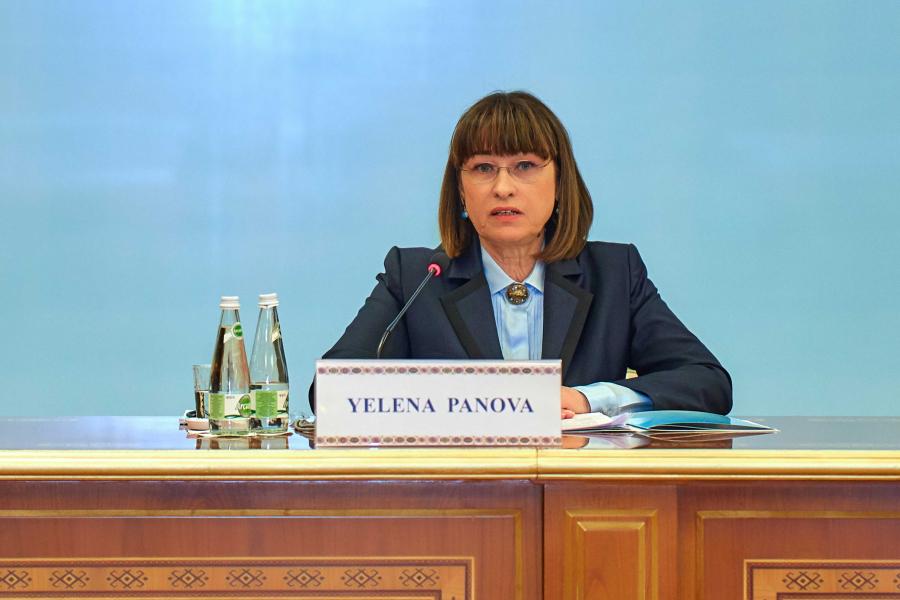
Photo | UN TURKMENISTAN
In order to fully deliver on its commitments under this Cooperation Framework, the UN system discussed and agreed with the Government of Turkmenistan on its configuration in accordance with the principle of “needs-based, tailored country presence”, called for in the UN development system repositioning resolution. The UN system identified and addressed gaps in its range of available expertise and competencies, reviewed its staffing structures and competencies and capitalise on resident and non-resident UN agency capacities and assets.
The composition of the UN Country Team almost doubled, from 10 to 18 Agencies. This underlines the ambition of the Cooperation Framework, as well as the willingness of UN agencies to support the country, given its strong commitment to the implementation of the 2030 Agenda for Sustainable Development.
In her statement the UN Resident Coordinator noted:
“A distinctive feature of the new Cooperation Framework is its vivid focus on the development of comprehensive partnerships to achieve the goals of the Program. Particular attention will be paid to building the partnership with civil society and private sector, whose innovative potential will be useful to achieve the objectives of the Cooperation Framework. The UN strategic partnership with financial institutions and development banks will help create conditions for stimulating entrepreneurship and attracting foreign direct investment. The UN in Turkmenistan will continue to cooperate with national partners in the field of human rights, namely with the Interdepartmental Commission of Turkmenistan to implement international human rights obligations”.
The heads of UNDP, UNICEF, UNFPA and WHO had also a chance to present their Agencies’ priorities that derived from the new Cooperation Framework.
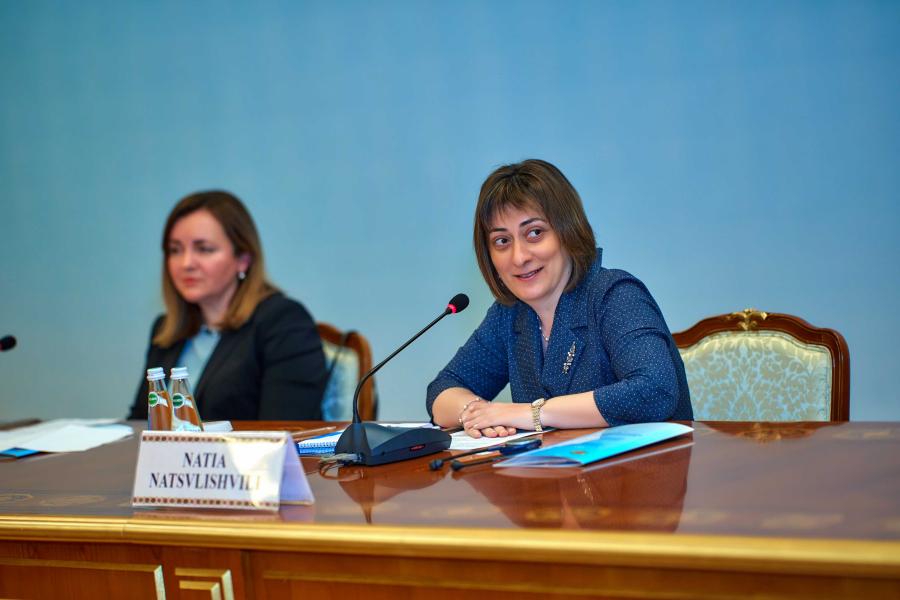
Photo | UN Turkmenistan
In her speech Ms. Natia Natsvlishvili, UNDP Resident Representative a.i., stated that the next UNDP cooperation program for the period 2021-2025 is guided by the Sustainable Development Goals and is designed to contribute to the implementation of the Government's priorities for improving the level of comfort of life and well-being of the population, with a special emphasis on
• Strengthening the rule of law and protecting human rights
• Continued development of economic diversification and stimulation of the private sector
• Improving the quality of people's health and social integration of people,
• Combating the effects of climate change, including through the use of renewable energy and in other important areas.
Ms. Natsvlishvili mentioned that:
“The UN Development Program took an active part in the development of all three strategic areas of cooperation between Turkmenistan and the UN for the next 5 years, as well as in determining all 5 strategic results. This indicates the scale of the ongoing partnership between Turkmenistan and UNDP in such important areas as economic diversification, the rule of law, human rights, healthcare, social integration, climate change, energy efficiency, disaster risk reduction and many others”.
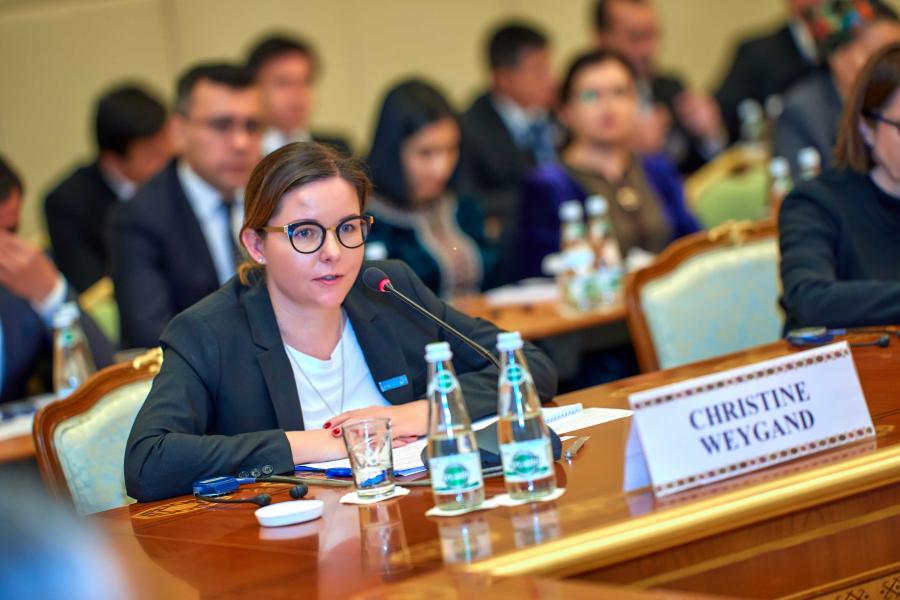
Photo | UN Turkmenistan
Ms. Christine Weigand, UNICEF Representative, presented the new UNICEF country programme document for 2021-2025. The new Programme of Cooperation will support the government’s priorities in four main areas:
1. Governance for children
2. Child health, nutrition and early development
3. Social and child protection
4. Quality and inclusive education
Ms. Christine Weigand voiced in her statement:
“The overall goal of the new UNICEF country programme of cooperation for 2021 – 2025 is to support the Government in meeting its commitments to respect, protect and fulfil the rights of children, as stipulated by the Convention on the Rights of the Child, the SDGs, and further reaffirmed in the National Plan of Action for Children. This new programme of cooperation highlights UNICEF’s ambition to leave no child behind and focus on the most vulnerable children in the country and support the government and society overall in providing all children in Turkmenistan the best possible start in life”.
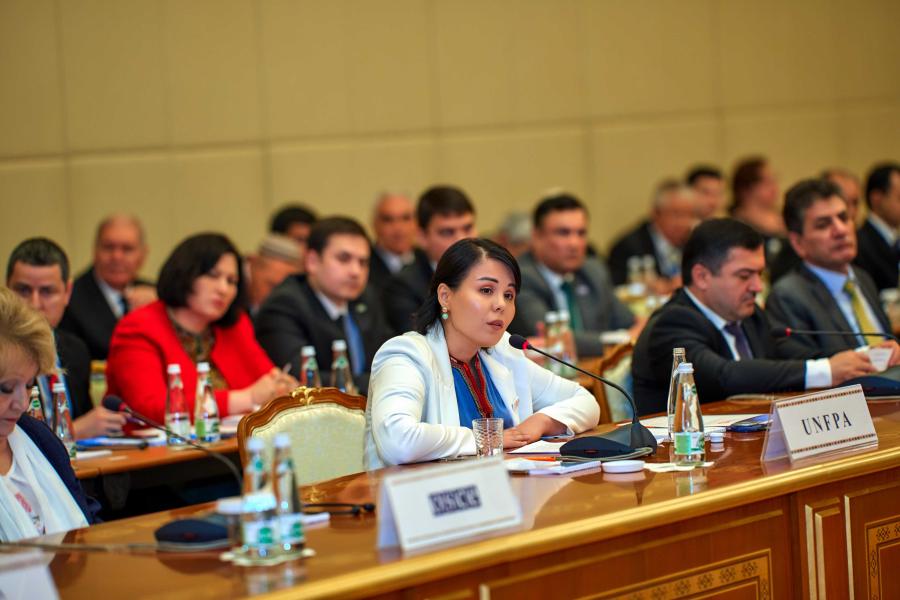
Photo | UN Turkmenistan
Ms. Ayna Seyitliyeva, UNFPA Assistant Representative presenting three main areas of a new Country Programme:
- Reproductive health and rights;
- Gender equality and the empowerment of women, and
- Using population data for development;
recalled that:
“For a clear understanding of our new cooperation program and how the selected priority areas will affect the development of our entire society, we need to think about a girl from Turkmenistan who is 10 years old. When a girl is able to exercise her rights, maintain her health, complete her education, and make decisions about her own life, she - and everyone around her - wins. If her health is better, and if she later starts a family, her children will also be healthier. She will be more productive, earn more money and, in turn, change our country and the world for the better. Any commitment to the well-being of a 10-year-old girl depends on the availability of quality statistics on young adolescents, the gender norms and parents ' attitudes towards health education at schools, mental health, quality of education, participation in decision-making, and other issues. In many ways, the future life path of every 10-year-old girl from our country, whether she lives in the city or in rural areas, whether she has a disability or not, will be a true test of the success of the 2030 Agenda, as well as the effectiveness of our country program”.
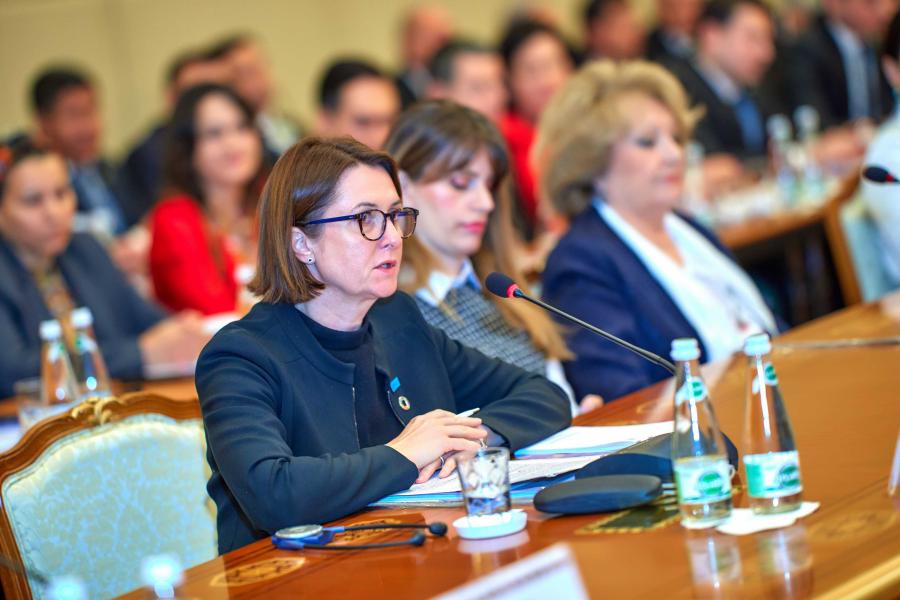
Photo | UN Turkmenistan
Ms. Paulina Karwowska, WHO Representative, outlined key areas for joint work with government of Turkmenistan, including improvement of health systems and Universal health coverage, which means that everyone can use effective health services when they need them without experiencing financial hardship. Moving towards UHC involves meeting three distinct goals:
• providing access to needed health services;
• ensuring services are of sufficient quality to be effective;
• and securing financial protection.
She mentioned:
“Universality and equity are central to each of our goal and each our collaboration in the areas of Non- communicable diseases, communicable diseases, mother and child, environut health and of course so vividly present in our work preparedness, surveillance and control of epidemics and health affecting disasters. For the latter we are sure that joint collaboration on COVID-19 Strategic Preparedness and Response which is our global responsibility will further strengthen global health preparedness”.
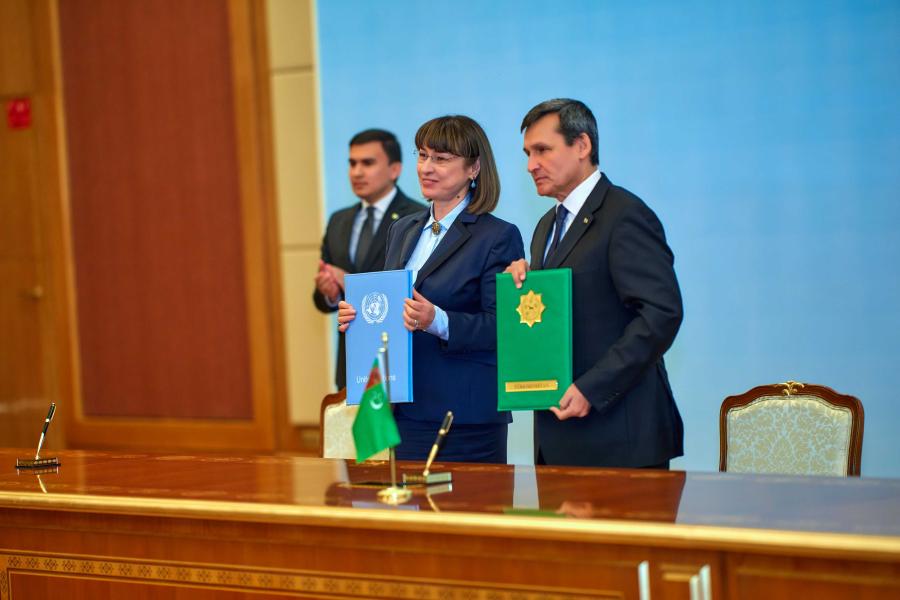
Photo | UN Turkmenistan
Although there are a few processes yet to be accomplished, nevertheless, the United Nations in Turkmenistan again reaffirmed its reputation of a strong and the most strategic partner for the Government of Turkmenistan in fulfilling is commitments to achieve Agenda 2030 in front of the big audience of Government, non-government, diplomatic and development actors in the country.
- Mahri Eyeberdiyeva, UN Turkmenistan Resident Coordinator Office Programme Communications and Advocacy Officer


